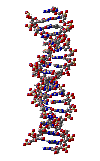|
Humans and apes, can their difference reside in hormones? (09/2005)
Big apes share more than 90% of our genome, with chimpanzees sharing a striking 96% and still, we are undoubtedly very different. So what are the mechanisms that allow such small genetic differences to create something as unique as our “humanness”? In an article published in the journal Medical Hypotheses1 a group of Portuguese researchers propose that differences in the metabolism of thyroid and steroids hormones are behind much of the variability found, not only between human and non-human primates, but also throughout human evolution.
It is well accepted that intelligence is dependent on brain size and, in fact, the brain of an ape has approximately a third of the volume of a human’s brain. This means that “factors” known to affect the size of this organ should also influence intelligence. And this the basis for the argument of H.R. Correia, S.C. Balseiro and M.L. de Areia, a group of Portuguese academics from the Department of Anthropology, University of Coimbra, Coimbra, Portugal, which propose that thyroid and sex steroids hormones were crucially involved in human evolution.
Both thyroid and sex steroids are known neuroactive hormones, meaning that they influence the development and function of the brain and so, also intellect. For example, lack of iodine – a crucial precursor for the production of thyroid hormone – leads to mental retardation by affecting dopamine, one of the most important neurotransmitters in the organism crucial for abstract intelligence. On the other hand, sex steroid hormones not only affect all the stages of brain development, but also control several central nervous functions throughout life. Estrogens (the hormone responsible for female secondary sexual characteristics), for example, are known to protect against verbal memory decline and reduce the risk of Alzheimer’s in women after the menopause. Receptors for this hormone and progesterone (the male equivalent) can be found throughout the central nervous system further emphasizing the importance of sex hormones in the function of this organ.
In addition, thyroid and sex steroids can also explain the physical changes occurring concomitantly with brain enlargement during human evolution. Both hormones affect body growth – and we know that body increase is an hallmark of human evolution – while sex steroids seem to be responsible for many of the physical changes acquired during this period, such as penis and breast enlargement, development of more sexual differentiated bodies, longer life span and full-time sexual receptivity. These traits also differentiate Homo sapiens from apes. Furthermore, the development of sex-differentiated brains, with women and men presenting different intellectual capabilities, such as man’s propensity to high visual-spatial ability versus women’s superior verbal skills superiority found in modern humans seems to be also the result of sex steroids.
Finally, several independent studies have shown that thyroid and sex steroids metabolism differ in humans and apes further supporting the team of researchers’ theory.
In a time when the development of subjects, such as genetics and neurophysiology, together with the recent news that chimpanzees share a striking 96% of our genome, raise yet again the question of what is behind this strange “Humanness” of ours, Correia, Balseiro and Areia’s hypothesis is undoubtedly very interesting. Nevertheless, further investigation to be understood and thoroughly proved is needed. But, if their theory is substantiated, it will not only help us to understand who/what we are, but, and maybe more importantly, will open the door to new treatments for cognitive dysfunctions and neuro-degenerative diseases.

1 Medical Hypotheses2005;65(6):1016-23
" Are genes of human intelligence related to the metabolism of thyroid and steroids hormones? –Endocrine changes may explain human evolution and higher intelligence”
Original paper’s author
Link to the original paper
|
In collaboration with the Observatório da Ciência e do Ensino Superior (OCES)
Financed by the Fundação para a Ciência e Tecnologia (FCT) |





